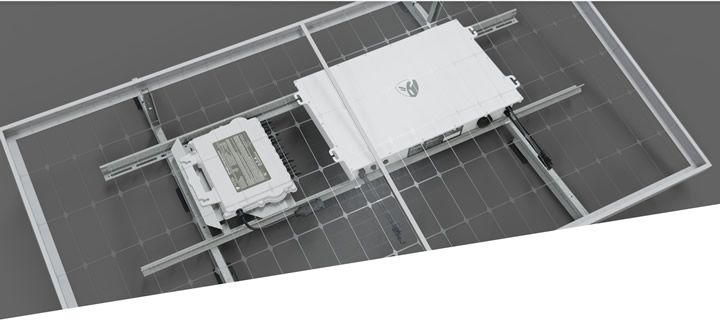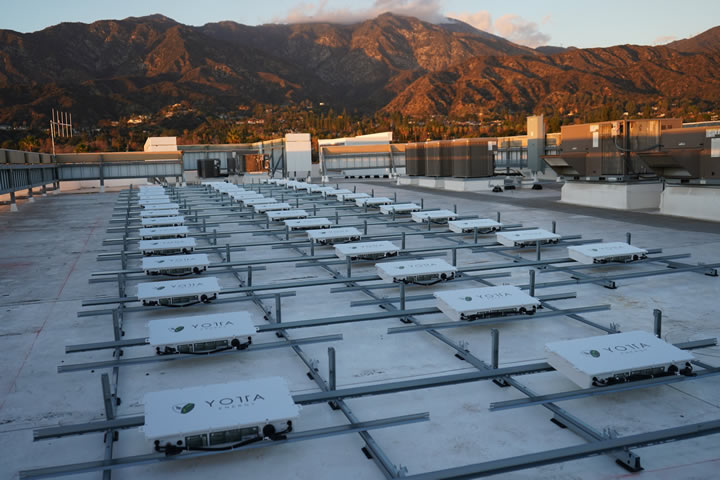Regarding plug and play, our architecture all relies on simple MC4 connectors. From the PV panel to the battery, and the battery to the microinverter, everything is extremely simple to install.
 Bringing Solar and Energy Storage together to make Energy Simple
Bringing Solar and Energy Storage together to make Energy Simple

Product Q&A with Ryan Davies, VP of Sales | Yotta Energy
Tell us about yourself and your role with Yotta Energy.
I’m Ryan Davies, an industry veteran of almost 15 years, and I was attracted to Yotta because of the chance to be a part of a groundbreaking technology and the incredible team of people I get to work with every day. Yotta energy has a vision to implement solutions in an under-served space - the solar+storage market. I lead a sales and marketing team which covers the entire U.S. and can help clients with topics ranging from battery sizing to PV design to proposals/payback analysis.
Tell us about Panel Level Storage and its abilities.
Our SolarLEAF battery provides a safe and simple storage solution for the commercial and industrial market. We’ve paired our battery with a native, phase balanced/monitored three-phase microinverter. The brilliance of our solution is in the integration of our battery into the racking, minimizing costly design/install/interconnection expertise. By “co-locating” the battery on the DC side, we’ve saved space, installation time, and costly continued maintenance. Our passive thermal management allows you to “set it and forget it.”
Why do you feel your systems are so well suited to help overcome any obstacles in the growth of commercial solar applications.
Very simply, the C&I space is a historically underserved market. According to the U.S. Energy Information Association (EIA) commercial and industrial buildings account for a bit over 60% of the total energy consumed. But estimates indicate that around 4% of commercial buildings have solar on them, and only a fraction of those use battery storage systems. Residential solar has been saturated with financing solutions and direct-to-owner sales. Utility scale is the realm of big developers and investment entities, in cooperation with utility companies. What’s left is a sector with a huge amount of open roofs, but no uniform blueprint for installation. That is where we come in. With our all-in-one system and our easy to implement technology, we provide an understandable and clear solution for installers and building owners alike.

You use the words “all in one” and “plug and play” when describing your systems. Tell us more about that and its value to your customers.
It’s rare to find one company that has dedicated its solutions to the commercial space. We’ve done so, and built a product line so that you can stay Yotta with your microinverter, cabling, and battery with very minimal additional products. Our monitoring system integrates the PV production and analysis, along with the battery state of charge and the inverter output. We consider Yotta Vision to be the gold standard in monitoring.
Regarding plug and play, our architecture all relies on simple MC4 connectors. From the PV panel to the battery, and the battery to the microinverter, everything is extremely simple to install. Plug and play also refers to the ease with which the commissioning process unfolds, as the products populate and show their product as soon as there is DC power, meaning that installers can leave the job site with assuredness.
What makes your products the “safest” on the market?
Our microinverter is equipped with rapid shutdown to meet the requirements for NEC 690.12. If phase loss happens on the utility side, the inverter (all three lines) will shutdown in 100 milliseconds. All voltages, frequency and start up times meet the IEEE-1547 grid standards. Regarding our most innovative technology, the SolarLEAF battery, we’ve gotten UL-1973, UL-9540, and UL-9540A approval. So we’ve been tested and passed every industry hurdle with flying colors! Our DC-coupled architecture keeps things low-voltage, safe, and easy to work with and install.
As an installer what advantages does Yotta Energy offer in distributions, training, ease of installation over other options?
Installers likely already know the benefits of microinverter technology. I’ll simply say that we’re bringing that ease-of-install and safety to a commercial market. Our four port microinverter actually amplifies the ease, as there are fewer MLPE on the roof. We offer full-site proposals and analytics for end customers, and cooperate hand-in-hand with Greentech Renewables to ensure quotes are accurate and shipped directly to the correct job-site.
Describe current market conditions you are seeing for commercial solar here in the US. What is your outlook for the next year plus?
Without getting into our personal forecasts, we’re seeing a growing realization that commercial solar is a vital part of many developer and installers portfolios. Net metering rules have been throttling the residential market, discouraging that sector. Yet utilities are providing massive incentives for the grid-services and flexibility that our batteries can provide, and the PV installation landscape is still strong when the end-customer has the assets and vision to engage in a smart, flexible, all-in-one solution like Yotta Energy! So we’re very excited with our trajectory, and that of the sector that we’re an innovator in.
The content & opinions in this article are the author’s and do not necessarily represent the views of AltEnergyMag
Comments (0)
This post does not have any comments. Be the first to leave a comment below.
